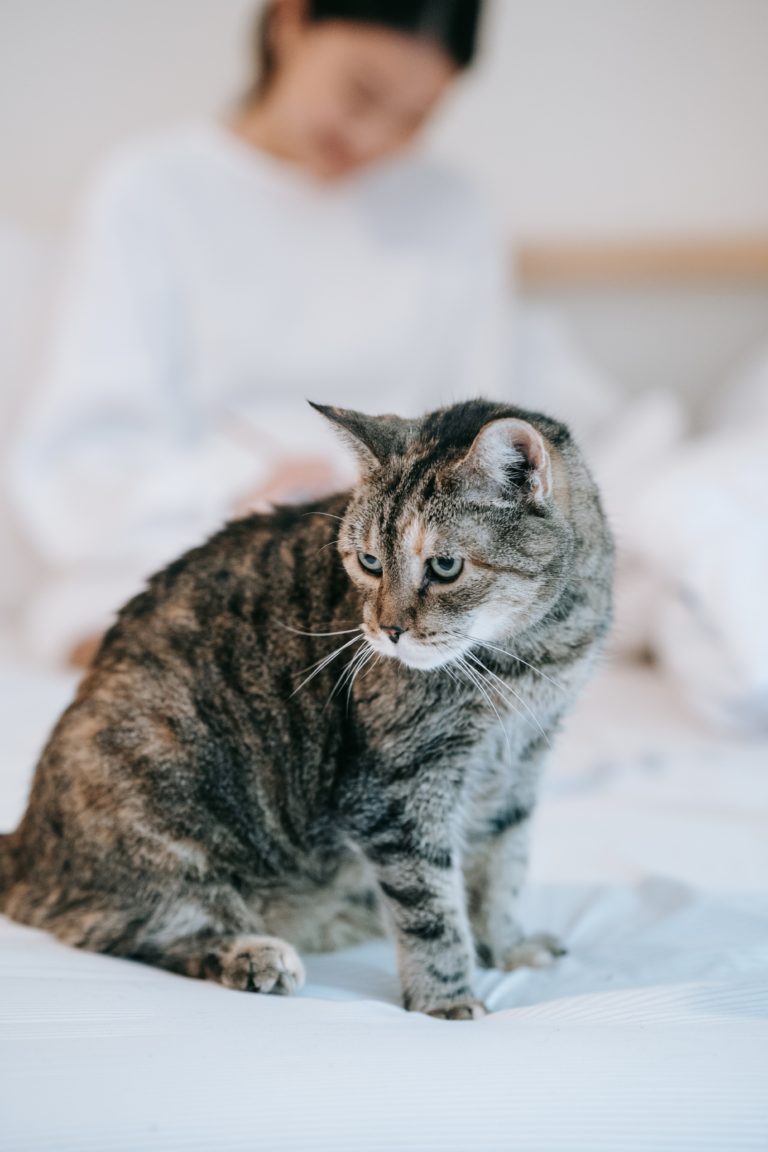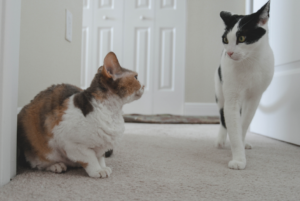


One of the most vexing issues in cat parenting is when cats urinate outside the litter box. Sometimes, they might choose a corner of a low traffic room, or under a staircase. The worst place, but surprisingly common, is on your bed. Why??!!
Why is my cat peeing on my bed?
Theories about peeing outside the litter box are plentiful, but why would a cat start peeing on your bed? Likely it’s because it smells like you and the cat is trying to communicate specifically with you about a problem. Whatever the problem is, its causing them stress and anxiety and they want relief. They identify you as their caretaker and comfort human and they don’t exactly know polite ways to get your attention about their problem, or else their version of polite communication is not getting the desired results.
We have only had one cat take to peeing on the bed and we studied up on all the possible reasons. What we found would surprise you; it’s either behavioral or medical or most likely both.
Cats are picky about their litter boxes
Cleanliness
It could be that it’s not being cleaned as frequently as the cat would prefer. This might be the case if the cat pees outside the litter box at times when the litter box is dirtiest. The general recommendation is to scoop litter daily, but for most of us, this isn’t always on top of the daily priority list. Especially when you have multiple cats, multiple litter boxes, work, small children, dogs, etc… When I can’t get to all the litter boxes, I at least get one of them. This has turned out to be an acceptable compromise to our cat brood as they have at least one clean box each day.
Wrong place, wrong size, wrong shape
If you haven’t noticed there are may different types of litter boxes. Generally cats like ones with open tops in easily accessible, but relatively private, locations. The odor and scattered litter grains however convince many cat parents to buy covered litter boxes or hide them behind hard to access pet gates and doors. If you have recently changed the location or type of litter box, your cat may be peeing on your bed to indicate they are not happy about this.
Automated litter boxes are a bit scary
We have tried many automated litter boxes over the years. These litter boxes are really convenient and help alleviate the gross chore of scooping litter, however they also have moving parts and make a lot of noise. Many cats can adapt, but some don’t. If you have recently added an automated litter box, they may be peeing on your bed to let you know this is an unacceptable upgrade.
Top-loading litter boxes
Top loading litter boxes can be really helpful to cut down on litter tracking as well as keep dogs from accessing the litter-box contents, while also giving the cat an open top they generally like. But not every cat will adapt. We have had at least one top loading litter box in our house at any time, and just 3 of our 7 cats ever routinely used it. If you recently changed all your boxes over to top loading, it might be worth trying a different type to give options.
Automated litter boxes are a bit scary
We have tried many automated litter boxes over the years. These litter boxes are really convenient and help alleviate the gross chore of scooping litter, however they also have moving parts and make a lot of noise. Many cats can adapt, but some don’t. If you have recently added an automated litter box, they may be peeing on your bed to let you know this is an unacceptable upgrade.
Top-loading litter boxes
Top loading litter boxes can be really helpful to cut down on litter tracking as well as keep dogs from accessing the litter-box contents, while also giving the cat an open top they generally like. But not every cat will adapt. We have had at least one top loading litter box in our house at any time, and just 3 of our 7 cats ever routinely used it. If you recently changed all your boxes over to top loading, it might be worth trying a different type to give options.
...or they might have a medical problem
When you can’t identify a particular change to the litter box access, location, type, or cleanliness, its time to think about medical reasons. For us, every male cat we have had has developed some type of urinary disease
Crystals
For 2 of our male cats, the urinary problem was in the form of urinary crystals. Peeing outside the litter box is one of the signs your cat might have crystals. One of our cats became completely blocked by the overabundance of crystals. We discovered this because he was peeing outside the litter box and the pee was dark brown indicating there was potentially blood in it. When we arrived at the vet that day, she quickly felt his bladder and then whisked him off to the back room. Her only words to me at the time were that he will need to stay for a few days. I was terrified. We were lucky to catch it in time, as I learned such blockages can be fatal if not treated quickly.
Are they doing it out of spite?
We only had one cat start peeing on the bed, however. It wasn’t just on the bed though, he liked to walk by areas and spray, too. We had made multiple trips to the vet about this problem and each time they did urinalysis and bloodwork he came back with a clean bill of health. No crystals, normal bloodwork, good teeth… etc.. So we initially thought this was a behavioral issue. We had just added a new puppy to the house and Froggy was also increasingly the target of our top cat bully who suddenly didn’t like him so the vet concluded he just didn’t like the dog and didn’t like Jewelly and was letting us know by peeing on our bed out of spite. Our best option was to re-home him to a single cat home. We didn’t like this option and re-dedicated ourselves to the problem.
Overaffection as a sign of a problem.
He started being overly affectionate. I can’t quite explain how we knew something was not right, but such a sudden change in his level of affection seemed off. He also started draping his belly acrossed our arms or legs which is also something I had never experienced from a cat. It didn’t look comfortable to me, but he really wanted to go to sleep like that.
FLUTD – Feline lower urinary tract disease.
Fast forward to one morning, a Saturday, when I watched him go from litter box to litter box without producing any urine. We took him immediately to the emergency vet, where we found out he was completely blocked. Not by crystals, but by an inflamed ureter.
Thus came our diagnosis as FLUTD, feline lower urinary tract disease. Though we had never heard of it, the vet said it is a very common disease where stress can cause painful inflammation of the urethra. Now all his prior signs of pain and stress came into better focus. Not only was he urinating on the bed, but was also acting very needy, crying out often for no apparent reason, and just had this look about him that spoke to how much he hated life. These were not just indications of stress, but of pain. Severe pain from his inflamed urinary tract.
Sequestered.
Since returning from the vet after urinary tract blockage, Froggy has been sequestered from the other animals. He lives now in our bedroom with his own litter box and takes his meals there. We can let him out only if we lock up the other cat, Jewelly, that bullies him. When we have time, we try to form positive interactions between him and Jewelly using treats with the hope of creating a new atmosphere for both. This slow re-introduction is a key tactic to ending the stressful situations and hopefully reducing the chance the FLUTD will relapse. We have also been training the new puppy to leave the cats alone by teaching her the “leave it” command. This approach and others we recommend are really useful to giving cats the space they need to escape rambunctious dogs.
Digging deeper
We are not veterinary professionals, so our personal experiences should not be substituted for a professional opinion. To read up more about FLUTD and the underlying causes, we found an article at the Cornell Veterinary Medicine website to be extremely helpful.
Newsletter Updates
Enter your email address below to subscribe to our newsletter


